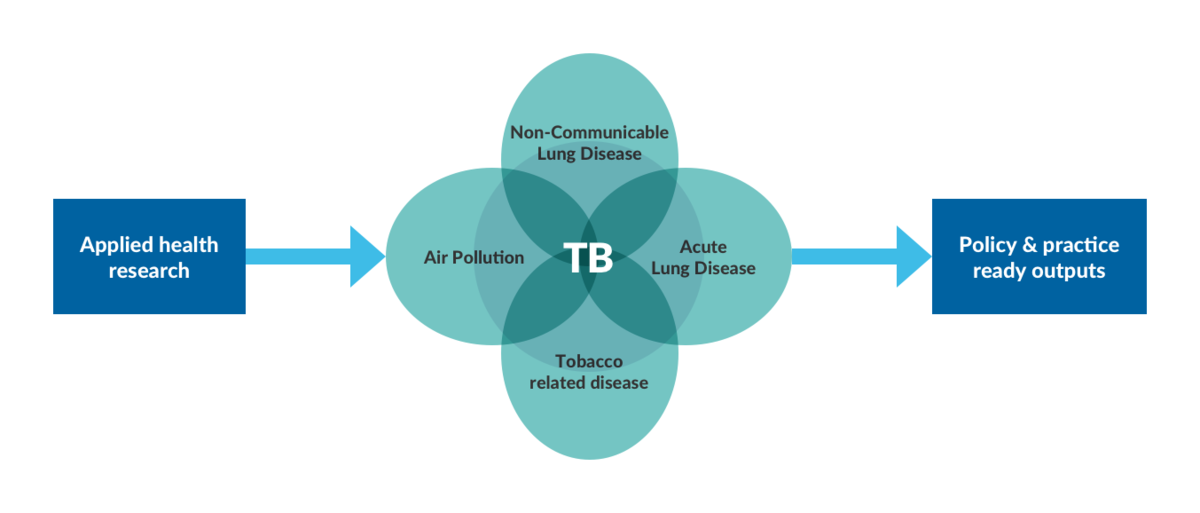Our strategic aim is to improve the health of children and adults in Africa through multi-disciplinary applied health research on lung health and TB.
The last 5 years have seen LSTM invest substantially in applied health research to make LSTM a leading global health research institution focused on making a difference to the day-to-day delivery of effective and affordable healthcare for the world's poorest people and populations. Important disciplines in applied health research include clinical, social science, health systems, health economics and health policy research.

These disciplines come together at LSTM through the Collaboration for Applied Health Research and Delivery (CAHRD) which has a mission to transform health systems to improve health in low and middle income populations. At the heart of CAHRD are established partnerships with individuals and organisations around the world who share this mission. LSTM is a world leader in applied global health research and is uniquely positioned with a critical mass of internationally excellent clinical and applied health research scientists with expertise in lung health and TB in the tropics, putting LSTM in an especially strong position to establish a highly successful Unit.
The burden of pulmonary diseases in Africa

To build the foundations for work to tackle this issue we have bought together a network of investigators from 10 African countries: Cameroon, Ethiopia, Ghana, Kenya, Malawi, Nigeria, South Africa, Sudan, Tanzania and Uganda.Almost half of the world's population, including 700 million people in Africa, relies on biomass fuels (animal dung, crop residues, wood) for their everyday fuel-energy requirements. These fuels are typically burned in open fires, often indoors, that emit smoke into the household environment and lead to high levels of household air pollution. Women and children, especially young children, experience high exposures to air pollution in the home; this has been linked to a range of adverse health outcomes including non-communicable lung diseases like chronic obstructive pulmonary disease (COPD) and lung cancer in adults and asthma in children. It is now recognised that household air pollution from biomass smoke is the third leading cause of global disability and death with 4 million deaths attributed to this exposure annually. These are major causes of ill health and death and that are particularly burdensome for the poorest people and communities in countries in sub-Saharan Africa in particular.
The International Multidisciplinary Programme addresses Lung Health and TB in Africa.
We work collaboratively with scientists from 22 institutions across 14 countries.
19 partners are involved in the implementation of 8 research projects. 16 of these partners are based in Cameroon, Ethiopia, Ghana, Kenya, Malawi, Nigeria, South Africa, Sudan, Tanzania & Uganda while 3 are based in the UK and New Zealand.
3 sub-contractors are responsible for delivering specific pieces of work: Lancaster University delivers the MRes in Quantitative Skills in Global Health in Yr 1, the Global Asthma Network prepare the annual Global Asthma Report, and BOLD analyse data from their centres.
3 collaborators offer their expertise in-kind. They are The American Thoracic Society (US), Vital Strategies (US) and The Union (France)

Our proposal has been reviewed by, and is supported by, leading respiratory academics and institutions including the leadership of The Union, the Pan-African Thoracic Society and the American Thoracic Society. From this platform we will focus our research efforts on improving lung health and fighting TB in Africa. We will support scientists and work to strengthen the research infrastructure of their institutions. We will conduct collaborative research to fill gaps in the current evidence base. For example, we will explore ways to bring basic effective and affordable care to people living in both remote rural areas and expanding cities and slums. We will do this in a way that is mindful of the broader context in which we will be working including using the Sustainable Development Goals (SDGs) as a framework for action and the need to ensure our work is generalisable.
We will develop a 10 to 20-year strategy for Unit-led applied global health research in lung health and TB to look well beyond the initial funding with our sights set on delivering improvements in health for Africa's poorest populations.